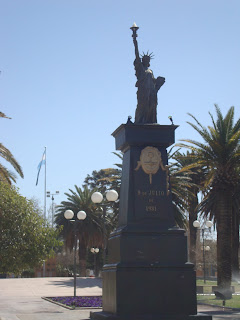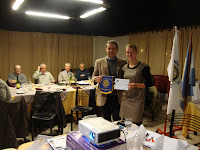It follows, then, that the return to the U.S. should be easier, less culturally “shocking.” Yet, while the culture shock may have been navigable, this has been by far the most challenging re-entry process I have undergone. Near the end of my time in Argentina, the Mendoza climbing community lost one of its most talented, charismatic, and fearless members, Ivan “Topo” Rocamora, in a climbing accident, and I lost my best friend. I’ve been thinking a lot about how my year in Argentina unfolded and about the role people play in our experiences. The move and entry into Mendoza was not an easy one for me at first (or second…), and many of you kindly offered listening ears and thoughtful feedback which helped me find my way. The truth is, even though things started to look up when I began working harder to amend my initial expectations and learned to more creatively and successfully face my challenges, I only really began to feel comfortable, grounded, and fulfilled once I’d found my people and begun carving out my niche amongst them; only after I became an integrated, integral part of a community did I find myself feeling truly capable of making progress on other fronts.
The empowerment and fulfillment I experienced once I’d found community, and the profound sadness and emptiness I’m left with after the loss of such an important member of it, leaves me with one hence-forth indubitable belief about people and about myself: that more than the environmental differences, the economic disparities or the cultural nuances, more than the work I am doing or the things I am studying, and more than the social and leisure activities that form an experience, it is the people with whom one undergoes that experience that truly define it while it is happening and memorialize it once it’s over.
Thus, I offer my most heart-felt gratitude to all of my friends and family in Argentina, those people who walked (or, as the case may be, climbed) with me through ups and downs this year as I found my niche in Mendoza, those who helped me make it my home. Thank you for taking me in, for helping me grow, and for comforting me, even as you faced your own great challenges and loss. I hope you will one day make the journey north to my home, so that I may show you the same.
Thank you, also, to the Rotary Foundation, for its generous support of my experience through the Ambassadorial Scholarship Program; I sincerely hope it will keep enabling profound life-changing experiences like mine for future generations through continued priority of this and its other educational programs. And a special thank you to the kind folks of the Hillsborough Rotary Club, without whose continued interest in and support of my endeavors, I’d quite likely be leading a much more mundane, less exciting, and certainly less well-traveled life today.
And finally, an enormous thank you to each of you, my extraordinary friends and family, for your kindness, patience, and guidance through this tumultuous year. I’m so fortunate to you have you in my life!

Como saben muchos de ustedes, hace poco terminé mi año en Argentina y ahora estoy de vuelta en EEUU, pasando tiempo con mi familia y preparándome para la próxima cosa. De varias maneras, mi vida en Mendoza fue más parecida a mi vida acá en EEUU que mis experiencias internacionales anteriores. Por la mayoría de los estándardes, Argentina es uno de los países del “en vías del desarrollo” más avanzados económica y socialmente, y el estándard de vida de la mayoría de la gente en Mendoza es más parecido a el de los norteamericanos (modestos) que el de la gente de los otros países latinoamericanos. Por lo menos, mi ambiente y mis actividades normales alla fueron mucho más familiares, por ejemplo, que los que experimenté mientras que trabajaba en una villa miseria enorme en Kenya.
Es lógico, entonces, que la vuelta a EEUU debe ser más fácil, menos chocante culturalmente. Sin embargo, ha sido la vuelta más difícil por mucho. Hace poco, la comunidad de andanistas mendocina perdió uno de sus miembros más talentoso, carismático, y atrevido—Ivan “Topo” Rocamora—y yo perdí mi mejor amigo. He estado pensando mucho en cómo desarrolló mi año en Argentina y en el papel que juega la gente en nuestras experiencias. La mudanza y entrada a Mendoza no fue nada fácil para mi al principio, y muchos de ustedes fueron muy amabales conmigo, me escucharon y me ofrecieron consejos para mejorar mi experiencia. La verdad es, aunque las cosas empezaron a mejorarse cuando empecé a trabajar más para cambiar mis expectativas y cuando aprendí a hacer frente a los desafíos con más creatividad, solo empecé a tener una base sólida y a sentirme cómoda, realizada y felíz cuando encontré a mi gente; solo después de hacerme una parte integrada e integral de una comunidad empecé a sentirme capaz de progresar en otras áreas.
El sentido de confianza y cumplilmiento que experimenté después de encontrar una comunidad, y la tristeza y el vacío profundos que siento después de haber perdido un miembro tan importante de ella, me dejan con una creencia indudable sobre la gente y mí misma: más que las diferencias ambientales, las disparidades económicas o matices culturales, más que el trabajo que hago o lo que estudio, y más que las actividades sociales, es la gente con la cual uno vive una experiencia que de veras la define mientras que pasa y que la hace memorable una vez que acaba.
Asi que, ofrezco mis gracias de corazón a mis amigos y familia en Argentina, a la gente que caminaba (o, en algunos casos, escalaba) conmigo por los altibajos este año mientras encontraba mi lugar en Mendoza, la gente que me ayudaba a hacerla mi hogar. Gracias por aceptarme, por ayudarme a crecer, y por consolarme, especialmente mientras ustedes enfrentaron sus propios desafíos y pérdida profunda. Espero que vengan algún día a mi hogar, para que les ofrezca lo mismo.
Gracias, también a la Fundación Rotaria por su apoyo generoso de mi experiencia a traves de La Beca de Buena Voluntad. Espero que siga posibilitando las experiencias como estas que cambian la vida para las generaciones futuras con el apoyo constante de los programas educativos. También, muchísimas gracias a la gente tan amable del Club de Rotary de Hillsborough, NC; sin su interés y apoyo constantes, es muy probable que yo viva una vida mucho más aburrida ahora.
Y, finalmente, una gracias enorme a cada uno de ustedes, a mi familia y mis amigos extraordinarios, por su amabilidad, su paciencia, y su orientación por este año tumultoso. ¡Soy muy afortunada de tenerles en mi vida!
 nd otherwise adventurers each year and, as such, home to a significant number of outdoorsy-type Argentines who work as mountain guides during the summer months. During a good season, these guides can make almost a year’s worth of wages in just 3 months, and they spend the rest of the year doing odds jobs here and there but mostly just taking advantage of the seemingly endless spectacular climbing spots around Argentina and the region. Lucky for me, I arrived just as the Aconcagua season was winding down and they were eager to get climbing again, so I’ve had some great opportunities to join in these mountain adventures.
nd otherwise adventurers each year and, as such, home to a significant number of outdoorsy-type Argentines who work as mountain guides during the summer months. During a good season, these guides can make almost a year’s worth of wages in just 3 months, and they spend the rest of the year doing odds jobs here and there but mostly just taking advantage of the seemingly endless spectacular climbing spots around Argentina and the region. Lucky for me, I arrived just as the Aconcagua season was winding down and they were eager to get climbing again, so I’ve had some great opportunities to join in these mountain adventures.













